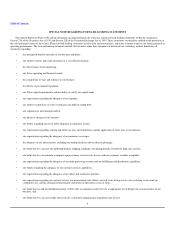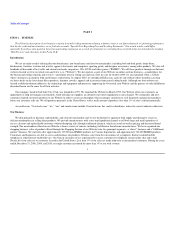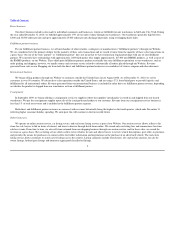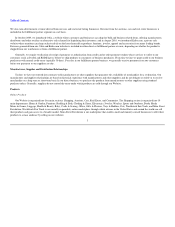Overstock.com 2010 Annual Report Download - page 15
Download and view the complete annual report
Please find page 15 of the 2010 Overstock.com annual report below. You can navigate through the pages in the report by either clicking on the pages listed below, or by using the keyword search tool below to find specific information within the annual report.
Table of Contents
ITEM 1A. RISK FACTORS
Please consider the following risk factors carefully. If any one of the following risks were to occur, our business, prospects, financial condition and
results of operations could be materially adversely affected, and the market price of our securities could decrease. These are not the only risks we face. In
addition, the global economic climate amplifies many of these risks.
Risks Relating to Overstock
Existing or future government regulation could harm our business.
We are subject to the same federal, state and local laws as other companies conducting business on the Internet or through other means. Today there are
relatively few laws specifically directed towards conducting business on the Internet. However, due to the increasing popularity and use of the Internet, many
laws and regulations relating to the Internet are being debated at the state and federal levels. These laws and regulations could cover issues such as user
privacy, behavioral advertising, auto-renewability of contract, freedom of expression, pricing, fraud, quality of products and services, taxation, advertising,
intellectual property rights and information security. Applicability to the Internet of existing laws governing issues such as property ownership, copyrights and
other intellectual property issues, taxation, libel, obscenity and personal privacy could also harm our business. For example, United States and foreign laws
regulate our ability to use customer information and to develop, buy and sell mailing lists. Many of these laws were adopted prior to the advent of the Internet
and do not contemplate or address the unique issues raised thereby. Consequently, laws adopted for the regulation of commerce that is not Internet based, may
present difficult or impossible compliance challenges, may be applied to us in an adverse way, or the judicial interpretation of the application of these laws to
our Internet-based business may be adverse to our interests. Many of those laws that do reference the Internet are still being interpreted by the courts and their
applicability and reach are therefore uncertain. Moreover, Internet advances and innovations may result in new questions about the applicability and reach of
these laws. Additionally, laws governing the permissible contents of products may adversely affect us, and we are subject to federal and state consumer laws,
including those governing advertising, product labeling, product content requirements and product safety. The laws not only apply to future manufacture of
consumer product, but also apply to existing inventories and may cause us to incur losses for any non-compliant items in our inventory, or which we may
have sold which may subject us to regulatory or civil actions. Some of the products we sell or manufacture may, under statutory or common law, from time to
time expose us to claims related to personal injury, death, environmental or property damage and may from time to time require product recalls or other
actions which may not be covered, in whole or in part, by our liability insurance. These current and future laws and regulations could harm our business,
prospects, financial condition and results of operation.
General economic factors may adversely affect our financial performance.
General economic conditions may adversely affect our financial performance. In the United States, changes in interest rates, changes in fuel and other
energy costs, weakness in the housing market, inflation or deflation or expectations of either inflation or deflation, higher levels of unemployment,
unavailability or limitations of consumer credit, higher consumer debt levels or efforts by consumers to reduce debt levels, higher tax rates and other changes
in tax laws, overall economic slowdown, changes in consumer desires affecting demand for the products and services we sell and other economic factors
could adversely affect consumer demand for the products and services we sell, change the mix of products we sell to a mix with a lower average gross margin
and result in slower inventory turnover and greater markdowns on inventory. Higher interest rates, transportation costs, inflation, higher costs of labor,
insurance and healthcare, foreign exchange rates fluctuations, higher tax rates and other changes in tax laws, changes in other laws and regulations and other
economic factors in the United States can increase our cost of sales and operating, selling, general and administrative expenses, and otherwise
9
























